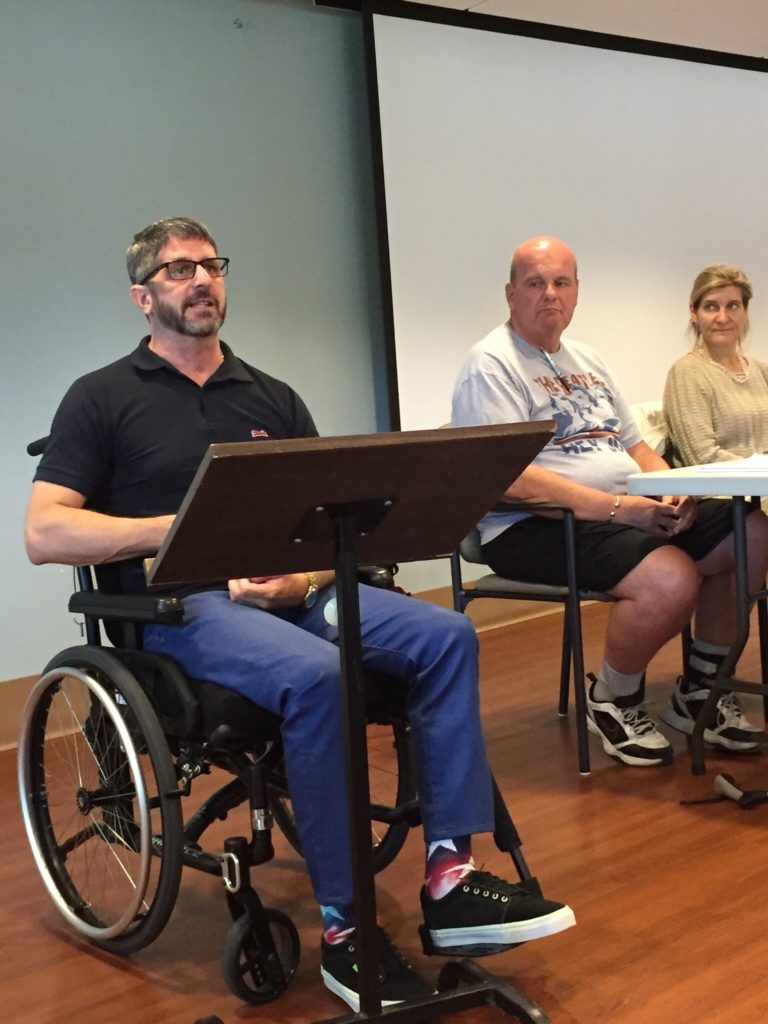Marshall Lucatch has several tattoos, but only one is visible to the world. On his left hand, “stroke survivor” is written in Hebrew.
“I am left-handed and my left hand doesn’t work,” said Lucatch. “It’s a visual reminder that I am a thriving stroke survivor.”
In 2015, Lucatch, then 45, appeared to be at the top of his game. He had been a successful realtor for 17 years and was the father of two teenagers. He was also in good shape, playing hockey regularly and hitting the gym five days a week.
“I was in the midst of selling a house when I had the stroke. My specialist called it the perfect storm,” Lucatch said. “High blood pressure, sleep apnea, stress and lifestyle.”
There are two types of strokes –ischemic and hemorrhagic. Lucatch suffered the far-less-common hemorrhagic stroke, which happens when a blood vessel breaks and bleeds into the brain. Within minutes, brain cells begin to die and damage can occur very quickly.
“The doctors didn’t think I was going to make it through the night. I had part of my skull removed, so that they could cauterize the bleed,” Lucatch explained. “God came to visit me when I was in intensive care and he told me three things. He told me I am not being punished and I need to be taught something and I should not be afraid. If I was afraid or timid, then I would be being disrespectful to my Creator.”
Lucatch remained in the hospital for 2½ weeks and was eventually moved to the Toronto Rehabilitation Centre for 2½ months. “I had no trunk control, my midsection wasn’t working at all. I was slurring my words and I lost the ability to spell. In rehab, I learned how to balance my weight and take steps again and I went for speech therapy,” said Lucatch. “My doctors said it was a blessing that I was physically strong before, because that’s what helped me through.”
During his period of recovery, Lucatch’s goals shifted. “The stroke has opened my eyes to life. I was always more interested in the destination before. On my new journey, I have seen people much worse off than myself. All I want to do now is help others,” he said. “That means everything to me.”
He has now dedicated himself to mentoring people with head injuries and doing motivational speaking gigs at health-care facilities, such as St. Joseph Health Centre, the Toronto Rehabilitation Centre and Community Head Injury Resource Services of Toronto. He is also making inroads within the Jewish community by talking to youth groups, high schools and sports teams.

Lucatch composed 20 key talking points, which he alternates depending on his audience. Topics include: self worth is not tied to your bank balance or your income level; some of the best feelings of fulfillment and self-completion or self-esteem can come from serving others; you have no control over stuff that happens to you, but you have total control over how you deal with such things; a good attitude and positivity will take you far in life; and without hope and faith you have nothing.
READ: CLASSICAL MUSIC DJ SOOTHES SENIORS’ SOULS
Lucatch attributes his success to time, hard work, God’s will and therapy. His cognitive skills were not affected, but he does have ongoing physical impediments as a result of the stroke. “I have limited movements in my left arm and my left hamstring doesn’t work properly. I am able to walk with a cane for short distances and I use a mobility scooter to get me places because I don’t drive. I have accepted my limitations and I push myself all the time,” he said.
Lucatch took his first steps without a cane last summer. “Standing hundreds of feet in the air, I did the CN Tower EdgeWalk. I golfed one handed with my right hand.… It wasn’t easy, but I did it,” said Lucatch with pride.
“I am a total believer that everything happens the way it’s supposed to, when it’s supposed to. I have simplified my life. My new goals may seem corny, but they are true: be the best me I can be and help others on their journey. Some people break down to have a breakthrough and that was me.”






